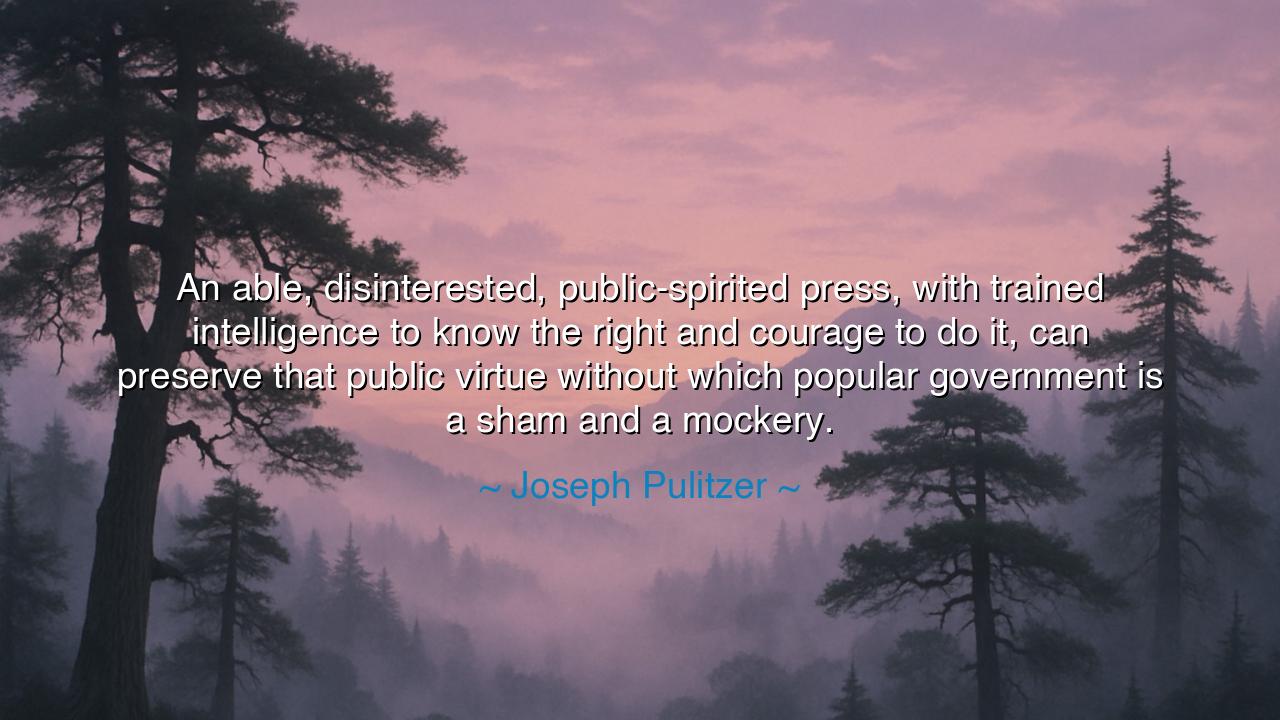
An able, disinterested, public-spirited press, with trained
An able, disinterested, public-spirited press, with trained intelligence to know the right and courage to do it, can preserve that public virtue without which popular government is a sham and a mockery.






The Guardians of Truth and the Light of Liberty
There are few powers on earth more subtle, more sacred, and more perilous than the press—the written voice of a free people. The publisher and visionary Joseph Pulitzer, whose name has become a measure of journalistic honor, once declared: “An able, disinterested, public-spirited press, with trained intelligence to know the right and courage to do it, can preserve that public virtue without which popular government is a sham and a mockery.” In these words, he gave warning and guidance for all ages: that the freedom of the people is chained or liberated according to the integrity of those who tell their stories.
To understand this truth, one must remember that democracy, that noble and fragile experiment, rests not on armies nor on wealth, but on trust—trust between the rulers and the ruled, trust in truth itself. The press is the living bridge of that trust. It carries light into darkness, giving voice to the voiceless and holding the mighty to account. Yet, Pulitzer reminds us, such power must be wielded with intelligence, not impulse; with disinterest, not ambition; and above all, with courage, for truth is rarely welcomed by those it exposes.
Pulitzer spoke from experience. In his own time—the late nineteenth century—the press was both a mirror and a battlefield. He had risen from poverty, a young Hungarian immigrant who became one of the most influential publishers in America. Through his paper, The New York World, he uncovered corruption, defended the common man, and expanded the boundaries of investigative journalism. Yet he also saw how easily the press could fall into sensationalism, distortion, and bias. Thus, his words were both a celebration of its potential and a warning against its decay. He knew that without a virtuous press, popular government—that is, democracy itself—would become a hollow performance, a mockery of liberty.
The ancients had their own version of this truth. In the republics of Greece and Rome, the orator and the scribe were sacred figures, entrusted to speak what others dared not. When those voices became corrupted—when words served power instead of justice—the republics fell. It was not the sword that destroyed them, but the silence of truth. Pulitzer saw the same danger in modern times. He knew that if newspapers and journals surrendered to greed, partisanship, or fear, the people would be deceived, their virtue eroded, their freedom lost beneath a thousand lies.
There is a heroic vision hidden in his plea: that the journalist, though armed only with words, stands as a guardian of civilization. It takes trained intelligence to uncover what is hidden and courage to speak it aloud. It is easy to flatter, easy to conform—but it is divine work to tell the truth when it is costly. Think of Nellie Bly, the journalist who feigned madness to expose the cruel treatment of the mentally ill in asylums; or Ida B. Wells, who faced threats and violence to reveal the horror of lynching in America. These women, and countless others like them, embodied Pulitzer’s ideal of a public-spirited press—one that risks comfort and safety to serve humanity’s conscience.
Yet this duty does not belong to the journalist alone. It belongs to every citizen who seeks to discern truth from falsehood. In the modern age, when voices are many and noise is great, the people must become the custodians of discernment. They must ask not, “Does this comfort me?” but “Is this true?” For as long as the public hungers for honesty and rewards integrity, the press will reflect that virtue. But if the public grows indifferent, even the noblest institutions will rot. Public virtue, as Pulitzer said, is the soul of freedom; without it, democracy becomes theater—grand in form, empty in substance.
Therefore, let this wisdom be carried to every generation: freedom requires truth, and truth requires courage. Whether spoken from the lips of a statesman, the pen of a writer, or the conscience of a reader, honesty is the first law of liberty. Support those who seek the truth, even when it burns. Honor those who expose wrongdoing, even when it offends your side. For a nation that silences its truth-tellers prepares its own chains.
And so, remember the teaching of Joseph Pulitzer: the fate of freedom rests not only in parliaments or courts, but in the integrity of those who report, and those who listen. When the press is able, when it is disinterested, when it acts with trained intelligence and courage, then public virtue endures—and the lamp of liberty will not go out.






AAdministratorAdministrator
Welcome, honored guests. Please leave a comment, we will respond soon